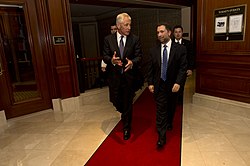Robert Satloff | |
|---|---|
 Sartloff with U.S. Defense Secretary Chuck Hagel | |
| Education | Duke University (BA) Harvard University (MA) St. Antony's College, Oxford (PhD) |
| Spouse | Jennie Litvack |
| Children | 3 |
Robert B. Satloff is an American historian [1] [2] [3] on Arab and Islamic politics, U.S.-Israel relations, and the Middle East. Since January 1993, he has been the executive director of the Washington Institute for Near East Policy (WINEP). Satloff is also a member of the board of editors of the Middle East Quarterly , a publication of the Middle East Forum.